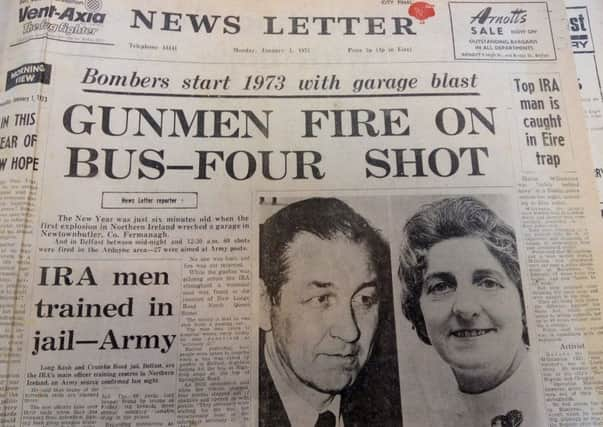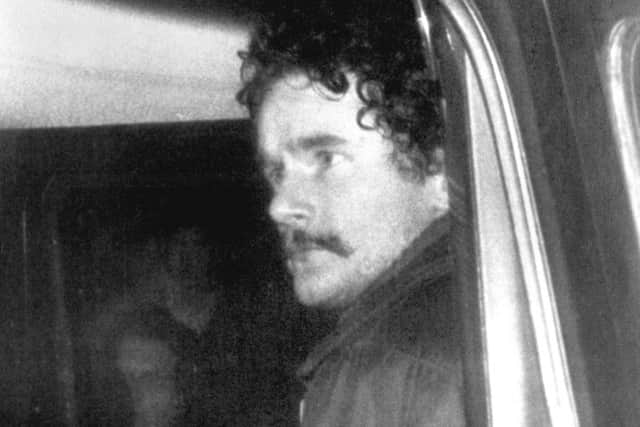Troubles eclipsed optimism of UK joining Common Market in 1973


The date was January 1, 1973, when the statisticians would record almost 500 Troubles deaths in the previous 12 months – an unwelcome statistic that would remain by far the worst annual death toll for the duration of the violence.
As the UK on Wednesday begins the process of formally leaving the European Union by triggering Article 50, the News Letter delves into the archives back to when it all began.
Advertisement
Hide AdAdvertisement
Hide AdThe paper’s first headline of 1973 read: ‘Gunmen fire on bus – four shot.’


The article said: “New Year was just six minutes old when the first explosion in Northern Ireland wrecked a garage in Newtownbutler, Co Fermanagh.”
Prime Minister Edward Heath’s promise of “better jobs and a higher standard of living,” did feature well down the front page but was overshadowed by reports of gun battles in Belfast, IRA internees were using Long Kesh as an officer training camp, and news that the “Army’s most wanted man in Londonderry” – Martin McGuinness – was “safely bedded down” in a Dublin police station having been detained near Ballybofey in Co Donegal.
Quoted in the News Letter, Mr Heath said there would be no noticeable overnight change for UK residents as a result of entering the EEC (European Economic Community).
Advertisement
Hide AdAdvertisement
Hide AdHe said: “We shall find more opportunities for those of our young people who have been to technical schools and to universities. In the environment we shall find that we are working together over a much larger area to protect the way in which we live, clear the air of pollution and seas of pollution.”


Ireland and Denmark also joined the EEC on the same day bringing the total number of member states at that time to nine.
The UK had applied to join the EEC in 1963 and again in 1967 but were refused because the French president at the time, Charles de Gaulle, reportedly questioned the UK’s commitment.
Mr Heath added: “There’ll be so many more opportunities, and it means also that there will be better jobs and a higher standard of living ... provided we have the imagination and energy and enterprise to seize these opportunities”.
Advertisement
Hide AdAdvertisement
Hide AdIn a New Year message to the people of Northern Ireland, Governor Lord Grey said: “1972 went out with sorrow for many and with shame for some, but 1973 should come in with hope for all men and women of goodwill.”
The same article included a message from Ulster Unionist leader Brian Faulkner.
It said: “My hope is that everyone, whatever their political or religious outlook, will recognise that they should live together here as neighbours. If this happens early in 1973 it may bring results.”
McGuinness arrested on day UK joined EEC
As the Northern Ireland public woke up to their first day of EEC membership, the News Letter also reported that wanted on-the-run Martin McGuinness had been detained in the Irish Republic.
Advertisement
Hide AdAdvertisement
Hide AdUnder the headline ‘Top IRA man is caught in Eire trap,’ the front page article outlines how the former butcher’s boy from Londonderry was arrested along with another terrorist suspect as they “were returning to a car packed with 50lb of explosives and thousands of rounds of ammunition they had abandoned earlier”.
It goes on to say that the pair made off from the vehicle close to a police checkpoint at Ballybofey, Co Donegal, 14 miles from the border and had “taken to the fields” to escape.
“But they returned later thinking the coast was clear and were caught in the trap,” the report adds.
It goes on to say: “Before the Troubles McGuinness (22) was a butcher’s boy in Londonderry. He became an activist in the city’s ‘no-go’ Bogside and Creggan.
“Operation Motorman drove him and his men out of their ‘no-go’ strongholds. He fled across the border to Buncrana.”